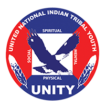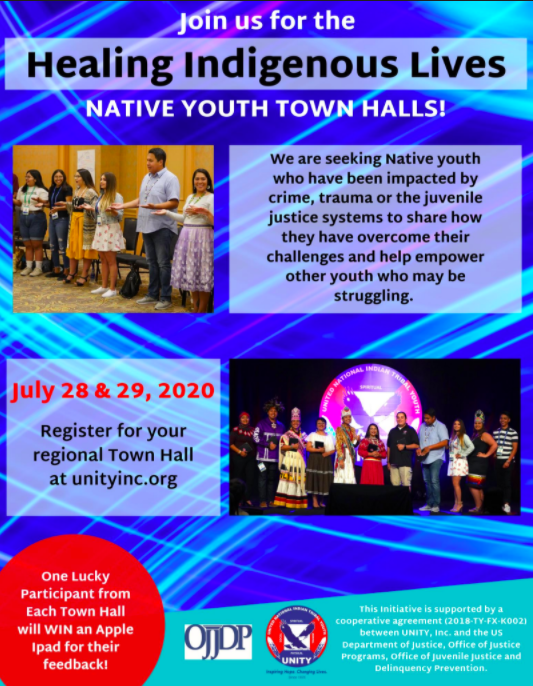- Tuesday July 28, 2020 1pm – 2:30 pm ET (90 mins) Note: Eastern Standard Time
The HILI Eastern Native Youth Town Hall
Peer Guides: Leslie Locklear, Rory Wheeler and Cheyenne Kippenberger
Registration: https://attendee.gotowebinar.com/register/ 6295584086025221131 - Tuesday, July 28, 2020 4pm – 5:30 pm CT (90 mins) Note: Central Time
The HILI Central Native Youth Town Hall
Peer Guides: Nataanii Hatathlie, Sonwai Wakayuta, Collin Church
Registration: https://attendee.gotowebinar.com/register/ 3208067474301013263 - Wednesday July 29, 2020 1pm – 2:30 pm MT (90 mins) Note: Mountain Standard Time
The HILI Mountain Native Youth Town Hall
Peer Guides: Vance Homegun, Audri Mitchell, Josiah Lester and Santana Bartholomew
Registration: https://attendee.gotowebinar.com/register/ 1218603438421888783 - Wednesday July 29, 2020 4pm – 5:30 pm PT (90 mins) Note: Pacific Standard Time
The HILI Pacific Native Youth Town Hall
Alaska & Hawaii are invited to attend this session
Peer Guides: Angela Noah, Leticia Gonzales and Savanna Rilatos
Registration: https://attendee.gotowebinar.com/register/ 3606137962556145679
The series of four Town Halls will be conducted remotely via webinar by time zones. In addition, United National Indian Tribal Youth Inc. (UNITY) will be accepting written comments for 30 days after the event at peerguides@unityinc.org.
The Healing Indigenous Lives Initiative (HILI) is supported by a cooperative agreement (2018-TY-FX-K002) between UNITY and the U.S. Department of Justice, Office of Justice Programs, Office of Juvenile Justice and Delinquency Prevention (OJJDP).
About HILI: The initiative will support and enhance Native youth engagement, coordination, and action related to public safety issues, with a focus on juvenile justice and delinquency prevention in Indian country. UNITY recruited a diverse group of youth mentors, who design and facilitate trainings in critical aspects of juvenile justice and delinquency prevention efforts.
Who Are the Peer Guides: The UNITY peer guides are a cohort of Native young adults who serve as an advisory committee in the development and implementation of the Tribal Youth Leadership Development Initiative. The peer guides were selected because of their ability to overcome past obstacles. The peer guides have given their feedback by identifying key risk and cultural protective factors that helped them in navigating the juvenile justice system and delinquency prevention programs.
Town Hall Questions:
- What helps you feel safe in your community?
- What do you see as the challenges with public safety in your community and how are young people impacted?
- How can young people contribute to creating a safe environment in your community?
- What does resilience mean to you and what do you think helps youth overcome difficult or traumatic situations in their lives?
- What types of programs could OJJDP support that would enhance public safety and help to ensure that juvenile offenders are held appropriately accountable to crime victims and tribal communities?
- What specific assistance can OJJDP provide to help existing programs, support innovative ideas to expand programs, and provide additional training and technical assistance?
- How can OJJDP support efforts to engage youth and build leadership skills in Native youth?
About UNITY
Founded in 1976, United National Indian Tribal Youth, Inc. (UNITY) is a national network organization promoting personal development, citizenship, and leadership among Native Youth. UNITY’s mission is to foster the spiritual, mental, physical, and social development of American Indian and Alaska Native youth ages 14 -24, and to help build a strong, unified, and self-reliant Native America through greater youth involvement. UNITY’s network currently includes 320 affiliated youth councils in 36 states. www.unityinc.org
About OJJDP
OJJDP provides national leadership, coordination, and resources to prevent and respond to juvenile delinquency and victimization. The Office supports states, tribes, and communities as they develop and implement effective and equitable juvenile justice systems that enhance public safety, ensure youth offenders are held appropriately accountable, and empower youth to live productive, law-abiding lives. OJJDP is a component of the Office of Justice Programs, U.S. Department of Justice. Learn more at www.ojjdp.ojp.gov


